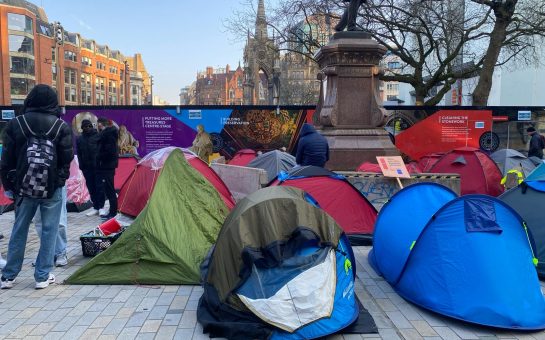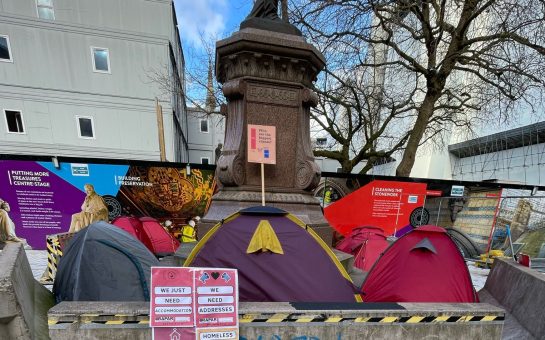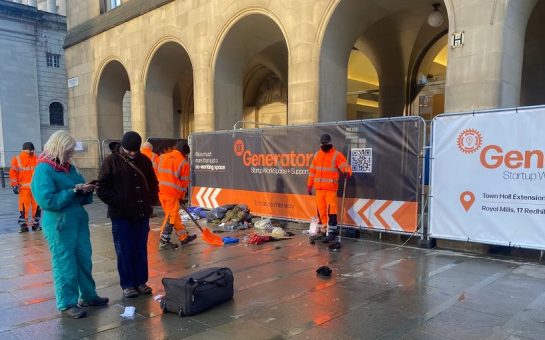Last night Muslims from Bosnia, Syria and East Turkestan shared poignant stories of their journeys as refugees and how their lives were transformed by political repression and war.
Sisters Dudiya Zilic and Nezira Cohadzic fled Bosnia to neighbouring Croatia when war broke out in 1992, eventually settling in Manchester.
Dudiya said: “In Bosnia under the Communist system, everybody worked, we were the same – same culture, food, but different religion. And suddenly, without warning, one morning I went to work and they put a barricade on my job.
“I will never forget how I had to leave my mum alone, my father had just passed away. I took my three children, my mum gave me some bread and I started to travel and I walked and walked, I didn’t even know where I would go.”
Nezira, who vividly remembers Sarajevo under siege, added: “I was scared, I had to leave, there was no option. I fell pregnant, I had to leave, people were killed. You couldn’t move anywhere without standing on somebody’s head or somebody’s leg.
“I had to get out of Sarajevo. There was a 95% chance that you would be killed and 5% that you would survive. I didn’t have any option.”
Ahmad Mujahed Nayef, a Syrian from the outskirts of Aleppo, recalled how his father was detained as a political prisoner for nine years in the notorious Tadmor prison – all for starting a youth club.
“The dark era in Syrian life was in 1981 when there was political opposition against the Syrian regime, which killed more than 40,000 citizens in the city of Hama. You couldn’t even dream of having any sort of political life.
“Any gathering was considered a conspiracy against the government. My father was taken from his home and for nine years nobody had a clue if he’s alive or dead. There was no way to get any sort of confirmation, not only my father, but thousands of people.”
After his eventual release they relocated as a family to the Gulf region and Ahmad eventually settled in the UK due to the continued brutality and coerciveness of the regime in Syria.
“He [my father] stayed there until he died. He never looked back. This country [Syria] was not going to give him any sort of dignity or freedom.
“Even if you are a Syrian out of Syria, they will still control your life by denying you a passport if you belong to a family that’s a threat to security. This was the moment I decided I’m not going to have this experience again and in 2005 I moved to the UK leaving everything behind me.”
CHINESE CONCENTRATION CAMPS
Aziz Isa Elkun, a Uyghur born in East Turkestan when the Cultural Revolution started in 1966, spoke of the ongoing plight of his people under Beijing rule.
During his youth Aziz protested against the Chinese government by demanding democracy, freedom of speech and equal rights for Uyghurs.
Following his graduation he secured a job with the government, but this was short lived as he was fired for hiding his ‘history’. Aziz eventually obtained a French visa and travelled to France and the UK.
“If I didn’t leave in 1999, there would be no one to speak on behalf of my people. If I didn’t leave my country I would be in the Chinese concentration camps. With many of my classmates, friends, including my mother, there is no communication, I cannot talk to anyone. They block all communication for Uyghurs.”
Leaving their home countries and travelling to the UK as refugees was not without its challenges. For Dudiya it was learning a new language, Nezira had to come to terms with not returning to her previous life in Bosnia, Aziz faced the painful reality that ‘everything’ he loved he had ‘lost’ while Ahmad sought to finally escape the tight grip of a regime which had deemed him a ‘threat to security’.
However, all the speakers expressed their gratitude for being able to start a new life in the UK, but none of them could forget their experiences of conflict which led them here, and the audience was given an essential glimpse into how it continues to shape their outlook on life.
The Muslim Arts and Culture Festival features more than 50 events across Greater Manchester over the next fortnight which celebrate the rich heritage of the Muslim diaspora communities. For more information visit https://macfest.org.uk/ or follow them on Twitter @MacFestUK


